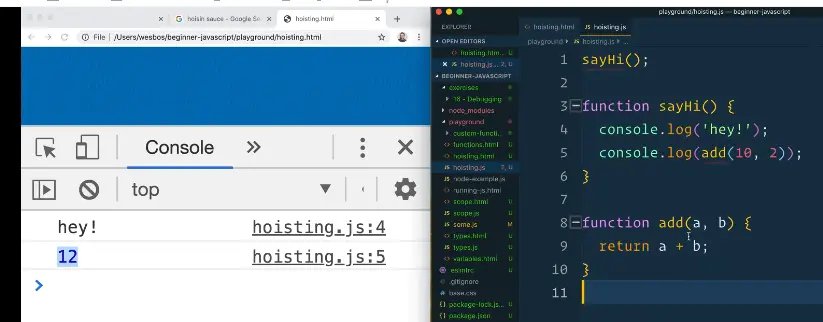Hoisting

Enjoy these notes? Want to Slam Dunk JavaScript?
These are notes based on my Beginner JavaScript Video Course. It's a fun, exercise heavy approach to learning Modern JavaScript from scratch.
Use the code BEGINNERJS for an extra $10 off.
We talked about this a little bit before.
Now we will get into the details about what it is, when you can use it and why you might want to use it.
Hoisting in JavaScript allows you to access functions and variables before they have been created.
There are two things in JavaScript that are hoisted:
- function declarations
- variable declarations.
Hoisting Function Declarations
We will focus on function declarations first.
Make a hoisting.html file in the /playgrounds directory and give it the base html.
Add a script source of ./hoisting.js and create a new JavaScript file with that name.
Do our usual console.log('It works!'); to check that it works.
Next, make a function sayHi();.
If you try to run this function before it exists, will it work?
You can see ESLint is complaining with warning of:
sayHiwas used before it was defined. eslint(no-use-before-define)
sayHi();
function sayHi() {
console.log('hey!');
}
If you open hoisting.html in the browser, does it work?
It does.
Why is that?
When you run your JavaScript file, the JavaScript compiler will take all of your function declarations and move them to the top of the file so they are all available before you use them.
Because of hoisting, you can technically run a function before it exists.
Let's do another example.
Add the following function 👇
function add(a, b) {
return a + b;
}
Now use that function within sayHi(), like so 👇
sayHi();
function sayHi() {
console.log('hey!');
console.log(add(10, 2));
}
function add(a, b){
return a + b;
}
Is that going to work?
It does.

That is because hoisting moves them to the top before it will actually run anything.
So JavaScript rearranges the file and puts all the variable and function declarations at the top of the file.
Why does that functionality exist?
Wes hardly ever uses hoisting, he prefers to declare his functions before using them.
When we get into modules, he prefers to put his separate functions in a module like util functions or math functions, and then import them as he needs them.
One argument Wes has heard for hoisting being useful is people often prefer when opening up a file, say you open up hoisting.js, they much prefer to first be able to see what does this file do, and then how does this file do it.
That way if you are quickly jumping into a file, you can quickly see from the first couple of lines "what does this file do".
If you do care about how it does it, you can go a bit further down into the file and see what it does, as shown below 👇
/* What does this file do? */
sayHi();
/* How does this file do it? */
function sayHi() {
console.log('hey!');
console.log(add(10, 2));
}
Personally, Wes doesn't use this method very much and doesn't like it all that much but that is just his personal opinion.
Variable Hoisting
The other type of hoisting is called variable hoisting.
If you were to go the top of the file and add 👇
console.log(age);
var age = 10;
What will happen? Is it going to error? Undefined? 10?
The value is undefined.
If you try to log another variable that does not exist, you will get an error 👇

Why is that?
What is happening is that JavaScript will hoist the variable declarations but it will not actually hoist the setting of the values.
So if after the page is loaded, you type age into the console, it will be set to 10.
So what JavaScript does is it says before everything runs, I am going to make my variables and then I'm just going to go ahead and update them.
It is basically doing the equivalent of the following 👇
var age;
console.log(age);
age = 10;
You can use hoisting to figure out if variables are created but not what their values are later in the file.
Hoisting is when variable declarations and function declarations are hoisted to the top of the file.
Only function declaration types of functions are hoisted, not function expressions (when you put a function in a variable).
Same thing goes with arrow function or any other type of function.
It is important to note that although let and const variables are hoisted, they are not initialised to undefined, unlike var variables. Hence, in the above example if you replace var with let or const, you would be presented with a ReferenceError saying - Cannot access 'age' before initialization
Find an issue with this post? Think you could clarify, update or add something?
All my posts are available to edit on Github. Any fix, little or small, is appreciated!

